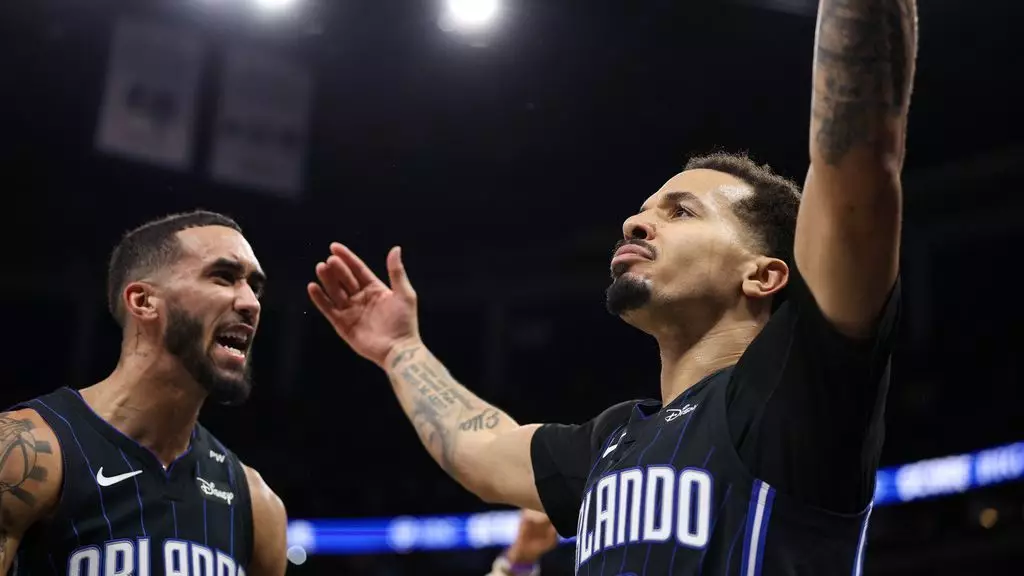In an astonishing display of resilience, the Orlando Magic completed a historic comeback against the Miami Heat on a night that will be etched in NBA lore. Trailing by 25 points in the first half and still down by a staggering 22 entering the final quarter, most spectators had already concluded that all hope was lost for the Magic. Yet, in a performance often deemed unfathomable, they roared back with a 37-8 run in the fourth quarter to claim a 121-114 victory. This game not only showcased the relentless spirit of the Magic but also raised questions regarding the Heat’s ability to close out games confidently.
To contextualize the Magic’s success, one must consider the statistical landscape of the NBA. Over the past five years, teams that entered the fourth quarter with a lead of at least 22 points had a perfect record of 796-0. This trend, however, was abruptly disrupted by the Magic’s comeback, which likely will spark conversations among coaches, players, and analysts about the volatility in today’s game. Could this serve as a turning point in how teams approach their leads in the final quarter? Coach Jamahl Mosley of the Magic expressed his disbelief after the game: “That’s something I haven’t seen in my years in the league.”
Notably, statistics highlighted the unusual context of this game: While Miami scored a commendable 40 points in the first quarter and had their strongest half of basketball (76 points), they simultaneously suffered a catastrophic 8-point performance in the fourth—the lowest for any team this season. This juxtaposition underlines both the NCAA’s scoring volatility and the inherent unpredictability of its matchups.
Orlando’s unlikely victory was even more pronounced considering the personnel on the court. The Magic were without key players like Paolo Banchero, Franz Wagner, Jalen Suggs, and Gary Harris, who missed significant game time. To add to their woes, Moritz Wagner suffered a potentially serious knee injury early in the game. Despite these setbacks, the Magic exhibited incredible depth and tenacity, relying on role players and bench contributions, particularly from Cole Anthony, who emerged as a standout performer. His 13 points in the fourth quarter contributed massively to the scoreboard and his overall tally of 35 points, 8 rebounds, and 9 assists—an impressive feat for a player coming off the bench.
Prior to this game, it had been over three decades since Orlando had come back from such a considerable deficit. Highlighting the depth of their performance, Coach Mosley aptly noted, “This is a group that just continues to fight,” emphasizing the culture of resilience being built within the Magic organization.
In the wake of this unforgettable game, one must reflect on the factors contributing to Miami’s collapse. Captain Bam Adebayo captured the essence of the Heat’s mentality succinctly, stating, “We relaxed because we were up. I feel like that’s the karma of the game.” This mindset raises concerns about their mental fortitude and consistency as the season progresses. Head Coach Erik Spoelstra acknowledged the changing nature of leads in modern basketball, reminding teams that “the 20-point lead is not what it was a decade ago.” Indeed, a sense of urgency must be maintained even in the face of large leads.
As both teams process this game, the Magic will embrace the momentum that comes from such a monumental win, while the Heat must regroup and reassess their approach to maintaining leads. The NBA, unpredictable as ever, has shown that anything is possible, and the lessons from this game will undoubtedly resonate as the season unfolds.
Ultimately, this game serves not only as a testament to the Magic’s spirit but also exemplifies a broader trend in the NBA: the changing dynamics of scoring, leads, and game management. It reiterates that no lead is safe, and every team must remain vigilant. As coaches, players, and fans respond to this turning point, the impact on the reputations and legacies of both franchises remains to be seen. The Magic celebrated a night of resilience, while the Heat grappled with the gravity of letting such a game slip through their fingers. In the world of sports, nothing can ever be taken for granted.

